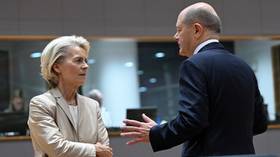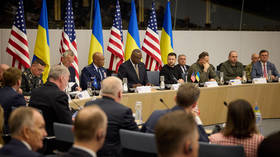Germany blocked EU boss’ NATO bid - Welt

German Chancellor Olaf Scholz intervened last year to prevent European Commission President Ursula von der Leyen from becoming NATO’s next secretary general, Germany’s Die Welt newspaper has said. Scholz reportedly felt that von der Leyen’s hardline anti-Russian stance would be a problem “in the long term.”
NATO Secretary-General Jens Stoltenberg received a fourth extension to his term as head of the military bloc last July. While Stoltenberg may remain in office until October, the alliance’s leaders have already begun jockeying to replace him.
At the end of last year, US Secretary of State Antony Blinken suggested von der Leyen to President Joe Biden as a potential replacement, Welt reported on Saturday. Biden approached Scholz with the idea, but was shot down, the report claimed, citing “several high-ranking EU officials and top diplomats.
“Scholz was categorically against von der Leyen becoming NATO chief,” one of these sources said. The German chancellor reportedly told Biden that the position of secretary-general is too important “to leave to a Christian Democrat from Germany,” and that von der Leyen’s antagonism toward Moscow “could prove to be a disadvantage in the long term,” in the newspaper’s words.
There is no formal process by which NATO chooses its secretary-general. Instead, member states discuss candidates among themselves until a consensus is reached.
NATO’s largest military power and de-facto controlling member, the US, is said to favor a woman for the role. Danish Prime Minister Mette Frederiksen was suspected to be a prime candidate last year, until she traveled to Washington in June and – according to Welt – failed to impress Biden or members of Congress. Stoltenberg’s term was extended a month later.
While Washington apparently wants a woman at the helm, Biden has already ruled out another leading female candidate, Estonian Prime Minister Kaja Kallas. According to Welt, the US president considers Kallas too critical of Moscow and incapable of building stable relations with the Kremlin when the conflict in Ukraine eventually ends.
With von der Leyen, Frederiksen, and Kallas out of contention, the Netherlands’ caretaker prime minister, Mark Rutte, is now described in the media as a frontrunner for the job. Welt’s sources stated that “support for him is increasing,” and that leaders in 21 member states – including Biden and Scholz – are prepared to endorse his candidacy. While Biden may have favored a woman, Rutte is reportedly seen as someone who could work with either him or former President Donald Trump, should the latter defeat Biden in this November’s election.
“The decision should, if possible, be made before the European elections in June,” a NATO diplomat told Welt. This weekend’s Munich Security Conference, the paper noted, will provide ample opportunity for Rutte to bring more supporters on board.













